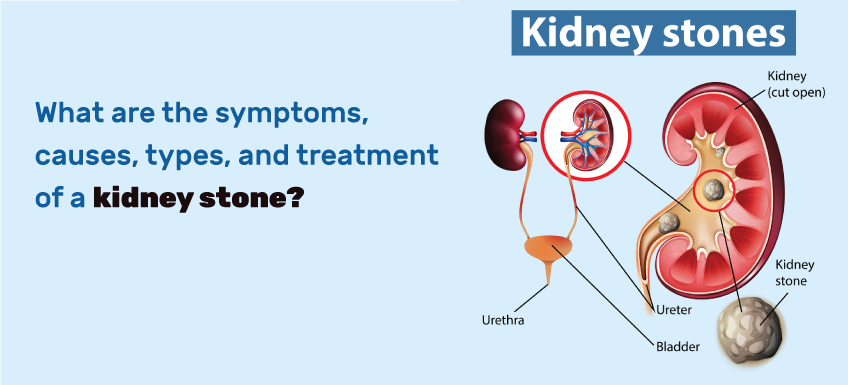
- 22-Feb-2023
What are the symptoms, causes, types, and treatment of a kidney stone?
A kidney stone or stones are indicated by back or side pain, blood in the urine, and nausea or vomiting in addition to the pain. Although kidney stones typically range in size from a chickpea to a golf ball, they can also be as little as a grain of sand. While smaller stones can pass through your urinary tract, bigger ones may require surgery. Read this article to get an insight on a kidney stone by Parth Hospital where the top Kidney Stone Doctors in Ahmedabad provide Kidney Stone Surgery.
What is a Kidney Stone?
An irregularly formed solid mass or crystal, such as a kidney stone, can range in size from a grain of sand to a golf ball. Depending on their size, you might not even be aware that you have a kidney stone (or stones). Even little stones can be quite painful as they pass through your urinary tract and leave your body. Consuming fluids could speed up the procedure, which could take three weeks.
Your ureter may become clogged with a huge kidney stone. The stone may then start bleeding and prevent urine from leaving your body. For a stone that can't pass on its own, surgery might be necessary.
Kidney stones: How often are they?
According to research, almost one in ten people will have kidney stones at some point in their lives. Kidney stones are much less prevalent in children than in adults, but they nevertheless happen for the same reasons. Children with asthma are four times more likely than children without asthma to experience them.
Those that are most susceptible to kidney stones What is the risk?
The risk of kidney stones is highest in white men in their 30s and 40s. Yet, kidney stones can occur in anyone.
Kidney stones can occur for a variety of reasons. They consist of:
1. Failing to consume enough liquids.
2. Eating meals that have the ingredients that help build stones.
Having kidney stones run in one's family.
1. An obstruction in the urinary system.
2. The chance of acquiring stones may also be increased by specific medical conditions. This is due to the possibility that they will alter the levels of the constituents of a kidney stone.
These ailments may consist of:
1. Hypercalciuria.
2. Elevated blood pressure
3. Diabetes.
4. Obesity.
5. Osteoporosis.
6. Cystic fibrosis and gout.
7. Renal cysts.
8. Parathyroid condition.
9. Diarrhea is persistent and inflammatory bowel illness.
10. A few surgical operations, such as stomach or intestinal surgeries or weight loss surgeries.
The chance of forming a stone may rise if you use certain drugs. These medicines consist of:
1. Diuretics.
2. Antacids are made of calcium.
3. Crixivan.
4. Dilantin and Topamax.
5. Ciprofloxacin.
6. Ceftriaxone.
You might also get kidney stones as a result of some diets. These foods consist of:
1. Poultry and meat.
2. Diets heavy in salt.
3. Sugars.
Are kidney stones inherited or genetic?
Yeah, there is a genetic side to kidney stones.
The urinary tract is what? How does it function?
Due to the fact that it eliminates waste and surplus fluid, the urinary tract is essential to your body. It is made up of your bladder, urethra, of your kidneys, and two ureters. Each organ performs a crucial function, in the sequence listed below:
Kidneys:
Which are the size of a fist and shaped like beans, are situated on either side of your spine, below your ribs. They filter 120 to 150 quarts of your blood each day to get rid of trash and maintain fluid equilibrium. One to two quarts of urine are produced by your kidneys each day.
Ureters:
Urine is produced by your kidney and then flows to the bladder through the tube-shaped ureter. Each kidney has one ureter. If kidney stones are excessively large, they may pass through the ureters or become lodged there. If the stone is very large, surgery can be necessary.
Bladder:
Your bladder is a urinary organ that is located between your hip bones. It may stretch to hold between 1.5 and 2 cups.
Urethra:
Your urethra functions as a channel through which urine travels, much like a ureter. That is where your urine, along with kidney stones, depart your body at the end of the urinary tract. Urination is the term for this.
How much time does a kidney stone take to form?
Kidney stones can exist for years while you are unaware of them. You won't feel anything as long as these stones are in your kidney where they are. When a kidney stone passes through your kidney, it usually causes pain. A stone can occasionally form faster, in just a few months.
Your risk factors should be discussed with your doctor. To determine how quickly stones form in your body, they could do a 24-hour urine test.
What kinds of kidney stones are most typical?
A calcium oxalate stone is the most typical kind of kidney stone. This kind develops when your urine contains both calcium and oxalate. It can occur if you have high oxalate levels, poor calcium levels, and insufficient fluid intake.
Uric acid can also cause stones, which is common. They are derived from a naturally occurring compound termed purine, a byproduct of animal proteins.
Do my kidney stones all have the same composition if I have several of them?
Kidney stones can be made of a variety of substances. Both a calcium oxalate and a uric acid stone could form in your body.
Symptoms of kidney stones
A kidney stone may exist for years while you are unaware of it. But if it starts to move or is very big, you can have the following symptoms:
1. Experiencing discomfort in your side or lower back. This discomfort may begin as a dull aching that comes and goes.
2. The pain is accompanied by nausea and/or vomiting.
3. Having urine with visible blood.
4. Having discomfort while urinating.
5. Having trouble urinating.
6. Having a greater urge to urinate.
7. Chills or a fever.
8. Having murky pee or urine that smells terrible.
9. Tiny kidney stones can not hurt or exhibit other signs at all. Your urine expels these "silent stones" from your body.
How are kidney stones Diagnosed?
Your doctor will talk to you about your health history and might perhaps recommend certain testing. These tests consist of:
Imaging Exams
Your healthcare professional will be able to view the size, shape, position, and quantity of your kidney stones with the aid of an X-ray, CT scan, and ultrasound. These tests assist your doctor in determining the best course of treatment for you.
The Blood Test
A blood test will show the health of your kidneys, search for infections, and check for biochemical issues that could cause kidney stones.
Testing Urine:
This examination checks the levels of the compounds that cause kidney stones and searches for indications of infection.
What is the treatment for kidney stones?
Your healthcare professional will first decide if you even require therapy after a diagnosis. When you urinate, some tiny kidney stones might pass from your body. This may cause severe agony. Your treatment choices, if determined by your doctor to be necessary, include both medication and surgery.
Medications
Drugs could be recommended for:
1. Lessen the pain. An over-the-counter drug like ibuprofen or, if you're in the emergency room, an IV narcotic may be suggested by your healthcare professional.
2. Control nausea and vomiting.
3. To help the stones pass, relax your ureter.
Surgery: Parth Hospital to meet the Best Gastroenterologist In Ahmedabad. We provide Kidney Stone Surgery through the top Kidney Stone Doctor In Ahmedabad
To treat kidney stones, four different surgical procedures are available. The first three are minimally invasive, which means the doctor enters your body by a small incision or a natural entrance.
Ureteroscopy: A little instrument called a ureteroscope is introduced into the urethra, the bladder, and the ureter to perform ureteroscopy. This device displays the kidney stones and either removes them in a surgical "basket" or uses a laser to split them apart. These smaller fragments of kidney stones can then easily pass through your urinary tract and leave your body.
Shockwave Lithotripsy: You are positioned on a certain kind of surgical table or tub for shockwave lithotripsy. The stone is subjected to powerful shockwaves that travel through water (s). The stones are split apart by the shockwaves, which makes it easier for them to leave your body.
Percutaneous nephrolithotomy is an option when existing treatments for kidney stones are ineffective due to the presence of too many stones, the size or weight of the stones, or the placement of the stones. With a little incision in your back, a tube is directly placed into your kidney during this treatment. An ultrasound probe is then used to break up the stones, and they are suctioned out such that no pieces need to be passed. Afterward, a urethral stent is implanted. Usually, patients are held overnight for observation.
Open Stone Surgery: An extended cut is made during open stone surgery. It's less frequent than minimally invasive procedures.
Conclusion
At best, kidney stones can be annoying; at worst, they can be excruciatingly painful. You should be evaluated by a healthcare professional as soon as possible to prevent your condition from growing worse. Kidney Stone Surgery may be required if the discomfort becomes severe. Remember to take your medication as directed, drink enough water, and adhere to any dietary recommendations. Moreover, keep in mind that kidney stones are a transient condition. They won't continue to bother you. If you are looking for Kidney Stone Doctor In Ahmedabad and the top Best Gastroenterologist In Ahmedabad contact Parth Hospital.


